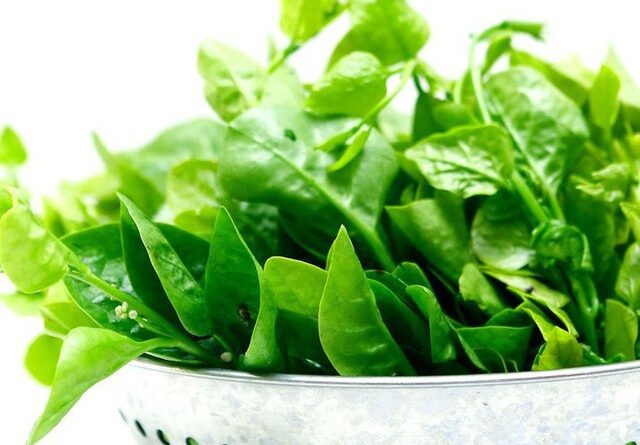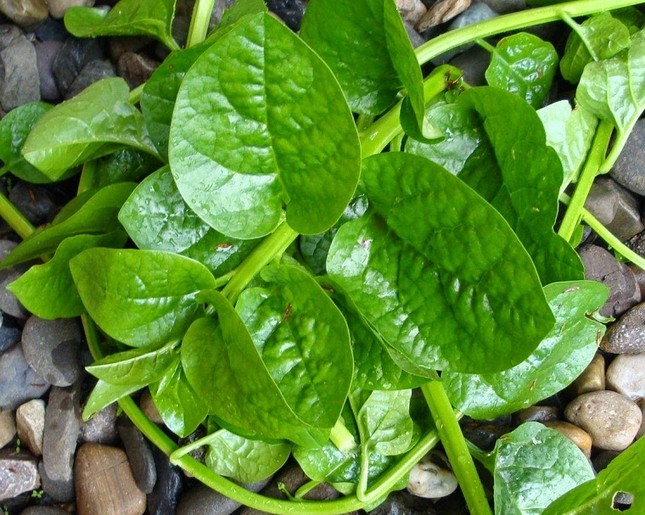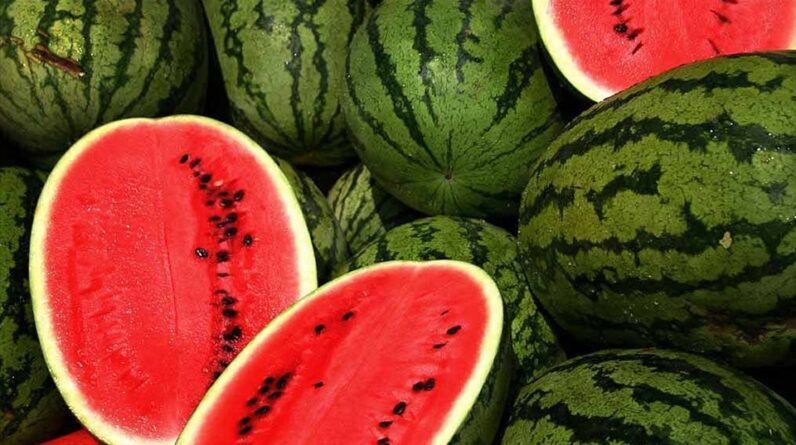
Spinach is a vegetable that contains many substances beneficial to health, helping to prevent many diseases and make the skin smooth and beautiful. However, this is only true when you eat right, eat in moderation. For some people who have a ‘great cavalry’ disease with spinach, eating this vegetable can also make the disease worse.
The health benefits of spinach for health Clearing heat, detoxifying, curing constipation Take a handful of spinach leaves, wash, crush, squeeze out the juice and add a little boiled water to cool and drink once. After a few drinks, it will be easy to have a bowel movement. Or 500g spinach, for fish sauce, salt, soy sauce cooked into soup to eat rice every day. Using it for a few days, the bowels will be clear, no longer constipated. Spinach is rich in vitamin A The recommended daily intake of vitamin A is 2,310 IU for women and 3,000 IU for men. With 510 IU of vitamin A, spinach is one of the best ways to hit your daily intake. In addition, vitamin A is very good for the immune system, helping to create white blood cells to fight off bacteria and viruses. The functioning of the reproductive system, bones, and eyesight also rely on the body’s necessary amount of vitamin A.

Iron is also a nutrient in spinach that is very beneficial for pregnant women. A small serving of spinach contains about 0.98 mg of iron, providing 5.4-12% of the daily iron needed for the body. Illustration: Internet
Spinach prevents osteoporosis High calcium content in spinach helps strengthen bones and teeth, improves muscles, nervous system and hormones in the body. This helps prevent the risk of osteoporosis. Most adults need about 1,000-1,200 mg of calcium per day, while spinach can provide 55 mg of calcium in a small serving. Spinach is good for pregnant and lactating women Folic acid is one of the important B vitamins for pregnant women because it prevents congenital neural tube defects like spina bifida. It is also involved in the creation of new cells, promoting cardiovascular health and preventing cancer. Iron is also a nutrient in spinach that is very beneficial for pregnant women. A small serving of spinach contains about 0.98 mg of iron, providing 5.4-12% of the daily iron needed for the body. Reduce fat and cholesterol
The mucus of spinach has the effect of absorbing cholesterol, endogenous and exogenous cholesterol are retained in the intestine. Because cholesterol is blocked, the fat in food cannot penetrate the intestinal membrane, cholesterol will be excreted in the stool. Therefore, eating spinach helps to eliminate fat, good for people with high fat and blood sugar.

Spinach is very rich in vitamin A. 100g of vegetables provides about 267% of the recommended amount of vitamin A/day. The amount of vitamin A in spinach not only helps protect the body from the risk of lung cancer and nasopharyngeal cancer, but also helps protect the eyes from cataracts or impaired vision. Illustration: Internet
Anti-cancer, eye protection, anti-aging. Spinach leaves contain a lot of antioxidant carotenoid pigments such as beta-carotene, zeaxanthin and lutein. These antioxidants neutralize harmful free radicals produced by the body. Spinach is very rich in vitamin A. 100g of vegetables provides about 267% of the recommended amount of vitamin A/day. The amount of vitamin A in spinach not only helps protect the body from the risk of lung cancer and nasopharyngeal cancer, but also helps protect the eyes from cataracts or impaired vision. Good for the Heart Foods rich in antioxidants and fiber are essential for heart health. In addition, fiber helps reduce bad cholesterol levels – which cause blood vessel blockage, leading to heart disease. Good for patients with anemia: The leaves of spinach contain a lot of iron, accounting for 15% of the recommended daily level, thereby overcoming anemia in humans. Also in 100g of leaves there are 109mg of calcium, 65mg of magnesium, accounting for 11% and 16% of the recommended daily intake, respectively. Calcium is good for bones, while magnesium helps absorb calcium in the body. Boosting the immune system 100g of spinach leaves contain 102mg of vitamin C, accounting for 170% of the recommended daily intake. This amount of vitamin C helps to improve the health of the immune system, prevent disease and reduce the duration of illness. There are many benefits, but according to physician Bui Hong Minh, Hanoi, for many people, eating spinach while carrying these diseases can cause harm to health.

Foods rich in antioxidants and fiber are essential for heart health. In addition, fiber helps reduce bad cholesterol levels – which cause blood vessel blockage, leading to heart disease. Illustration: Internet
People who should absolutely not eat spinach People with kidney stones Spinach contains a lot of purines – organic compounds that, when entering the body, will turn into uric acid, increasing the risk of developing kidney stones. The oxalic acid in spinach increases the concentration of calcium oxalate in the urine, leading to the development of kidney stones. Newbies get tartar Spinach easily creates stains on teeth because the oxalic acid in spinach is insoluble in water. People who have just had tartar are advised not to eat spinach for 1-2 weeks. People with stomach pain The large fiber content in spinach can make the stomach uncomfortable when eating a lot. Therefore, people with stomach pain should not eat spinach.

Folk often use spinach as a vegetable to cool down, add new fluids, prevent dryness and prevent constipation because nettle has laxative properties. But also because of this feature, people with diarrhea and loose stools should not eat. If intentionally eaten, the nettle will be the cause of the disease worse. Illustration: Internet
People with diarrhea, loose stools Folk people often use spinach as a vegetable to cool down, add new fluids, prevent dryness and prevent constipation because nettle has laxative properties. But also because of this feature, people with diarrhea and loose stools should not eat. If intentionally eaten, the nettle will be the cause of the disease worse. Notes to keep in mind when eating spinach Although spinach is rich in nutrients (1/2 cup of spinach, when cooked, provides 190% of vitamin A, 20% of iron needed by the body) but should not be abused. Herbalist Minh said, if abused this vegetable will cause the following specific harms: Poor absorption: Eating too much spinach makes the body poorly absorbed because it contains a high content of oxalic acid. This is a chemical that has the ability to bind with calcium and iron, making it difficult for the body to absorb other important nutrients. Therefore, when eating spinach, you should eat it with foods rich in vitamin C such as oranges, lemons, tomatoes, star fruit. Safe spinach is usually yellowish green, not green, dark green like chemical sprayed vegetables. Leaves have short, thick blades, growing in proportion to the stem. Crispy, firm vegetable stems are not as shiny as vegetables that are sprayed with growth stimulants.

Spinach contains a lot of purines – organic compounds that, when entering the body, will turn into uric acid, increasing the risk of developing kidney stones. The oxalic acid in spinach increases the concentration of calcium oxalate in the urine, leading to the development of kidney stones. Illustration: Internet
Spinach when combined with beef will lose its laxative properties, worse digestion. People who are constipated, if these two foods are combined, they will make the disease worse. Do not eat raw spinach: When eaten raw, it will cause bloating and indigestion, which is why according to folk experience, this vegetable with a lot of mucus needs to be cooked thoroughly. Not to mention, thoroughly cooking the spinach before eating also helps you make the most of the nutrients in this vegetable. Therefore, it is absolutely forbidden to eat raw spinach. Do not eat spinach to stay overnight: Many families have the habit of eating spinach soup that does not run out, often overnight to eat for the next meal. This is a very dangerous habit in general. The reason is that the nitrate content in green vegetables is quite high, if cooked for too long, bacteria will be decomposed, the nitrate will form nitrite – a carcinogen. When nitrite is taken into the stomach through ingestion, N-nitroso is formed. This compound can cause cancers such as esophagus, stomach and digestive system diseases. Therefore, it is best if you finish eating and have leftover vegetable soup, you should throw it away to protect the health of the whole family. Causes yellowing and staining of teeth: The mucus in spinach, when eaten too much, will form plaque and become irritated in the teeth because it does not dissolve in water.








